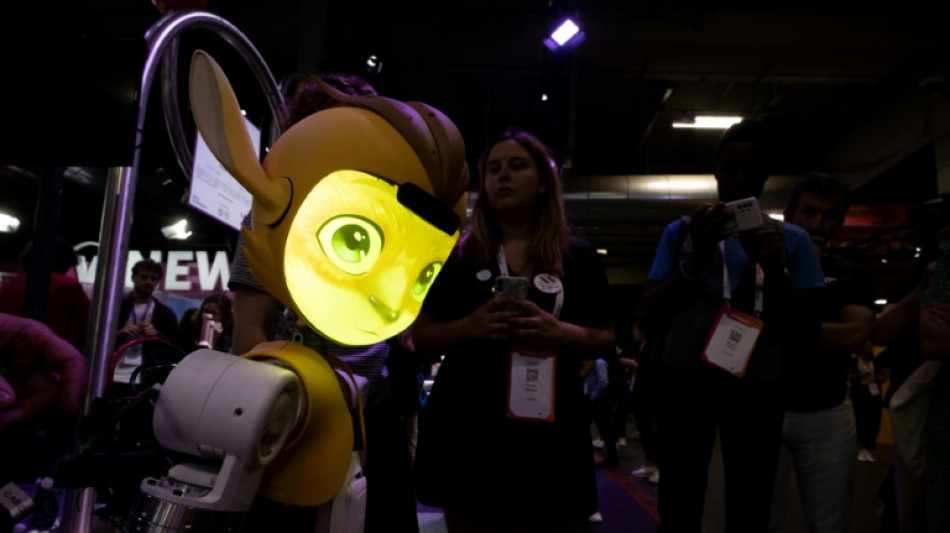
-
 Gang members given hundreds-years-long sentences in El Salvador
Gang members given hundreds-years-long sentences in El Salvador
-
Chargers, Bills edge closer to playoff berths

-
 Gang members given hundred-years-long sentences in El Salvador
Gang members given hundred-years-long sentences in El Salvador
-
Hosts Morocco off to winning start at Africa Cup of Nations

-
 No jacket required for Emery as Villa dream of title glory
No jacket required for Emery as Villa dream of title glory
-
Amorim fears United captain Fernandes will be out 'a while'

-
 Nigerian government frees 130 kidnapped Catholic schoolchildren
Nigerian government frees 130 kidnapped Catholic schoolchildren
-
Captain Kane helps undermanned Bayern go nine clear in Bundesliga

-
 Captain Kane helps undermanned Bayern go nine clear
Captain Kane helps undermanned Bayern go nine clear
-
Rogers stars as Villa beat Man Utd to boost title bid

-
 Barca strengthen Liga lead at Villarreal, Atletico go third
Barca strengthen Liga lead at Villarreal, Atletico go third
-
Third 'Avatar' film soars to top in N. American box office debut

-
 Third day of Ukraine settlement talks to begin in Miami
Third day of Ukraine settlement talks to begin in Miami
-
Barcelona's Raphinha, Yamal strike in Villarreal win

-
 Macron, on UAE visit, announces new French aircraft carrier
Macron, on UAE visit, announces new French aircraft carrier
-
Barca's Raphinha, Yamal strike in Villarreal win

-
 Gunmen kill 9, wound 10 in South Africa bar attack
Gunmen kill 9, wound 10 in South Africa bar attack
-
Allegations of new cover-up over Epstein files

-
 Atletico go third with comfortable win at Girona
Atletico go third with comfortable win at Girona
-
Schwarz breaks World Cup duck with Alta Badia giant slalom victory

-
 Salah unaffected by Liverpool turmoil ahead of AFCON opener - Egypt coach
Salah unaffected by Liverpool turmoil ahead of AFCON opener - Egypt coach
-
Goggia eases her pain with World Cup super-G win as Vonn takes third

-
 Goggia wins World Cup super-G as Vonn takes third
Goggia wins World Cup super-G as Vonn takes third
-
Cambodia says Thai border clashes displace over half a million

-
 Kremlin denies three-way US-Ukraine-Russia talks in preparation
Kremlin denies three-way US-Ukraine-Russia talks in preparation
-
Williamson says 'series by series' call on New Zealand Test future

-
 Taiwan police rule out 'terrorism' in metro stabbing
Taiwan police rule out 'terrorism' in metro stabbing
-
Australia falls silent, lights candles for Bondi Beach shooting victims

-
 DR Congo's amputees bear scars of years of conflict
DR Congo's amputees bear scars of years of conflict
-
Venison butts beef off menus at UK venues

-
 Cummins, Lyon doubts for Melbourne after 'hugely satsfying' Ashes
Cummins, Lyon doubts for Melbourne after 'hugely satsfying' Ashes
-
'It sucks': Stokes vows England will bounce back after losing Ashes

-
 Australia probes security services after Bondi Beach attack
Australia probes security services after Bondi Beach attack
-
West Indies need 462 to win after Conway's historic century

-
 Thai border clashes displace over half a million in Cambodia
Thai border clashes displace over half a million in Cambodia
-
Australia beat England by 82 runs to win third Test and retain Ashes

-
 China's rare earths El Dorado gives strategic edge
China's rare earths El Dorado gives strategic edge
-
Japan footballer 'King Kazu' to play on at the age of 58

-
 New Zealand's Conway joins elite club with century, double ton in same Test
New Zealand's Conway joins elite club with century, double ton in same Test
-
Australian PM orders police, intelligence review after Bondi attack

-
 Durant shines as Rockets avenge Nuggets loss
Durant shines as Rockets avenge Nuggets loss
-
Pressure on Morocco to deliver as Africa Cup of Nations kicks off

-
 Australia remove Smith as England still need 126 to keep Ashes alive
Australia remove Smith as England still need 126 to keep Ashes alive
-
Myanmar mystics divine future after ill-augured election

-
 From the Andes to Darfur: Colombians lured to Sudan's killing fields
From the Andes to Darfur: Colombians lured to Sudan's killing fields
-
Eagles win division as Commanders clash descends into brawl

-
 US again seizes oil tanker off coast of Venezuela
US again seizes oil tanker off coast of Venezuela
-
New Zealand 35-0, lead by 190, after racing through West Indies tail

-
 How Can Gum Disease Lead to Tooth Loss in Kyle, TX?
How Can Gum Disease Lead to Tooth Loss in Kyle, TX?
-
West Indies 420 all out to trail New Zealand by 155


Rise of the cute robots
The red eye that refuses to be extinguished, the metal body that cannot be crushed -- for many of us the word "robot" conjures one image: the Terminator.
But robots are now everywhere, serving as companions in care homes or vacuum cleaners in our homes, and manufacturers are keener than ever to design friendly machines.
"At first we noticed the kids could be a bit afraid," said Do Hwan Kim of his firm Neubility's tiny delivery robot.
To get around the problem, the firm added big doughy eyes that can indicate, making it look like the world's friendliest futuristic wheelie bin.
Dozens of the machines now trundle around campsites, university campuses and golf courses across South Korea.
"Campsites even use it on their posters," Kim told AFP at the VivaTech trade fair in Paris, underlining its transformation from potential threat to family friend.
And VivaTech played host to plenty of other robots designed with cuteness in mind -- ones with cartoon animal personas, others that looked like children's toys from the 1980s.
The aesthetic stands in stark contrast to the creepy dog-bots and anonymous drones that have become standard.
- 'Escaped' from cartoon -
As robots have become more common, a whole field of academia has grown up studying the interaction between machines and humans.
Kerstin Dautenhahn of Waterloo University in Canada, one of the most noted researchers in the area, said she had seen a huge shift in the way manufacturers looked at design: from an all-consuming concern with function to an acute awareness of appearance.
"What you find in many, many fields... is that people pay a lot of attention to how the robot moves, how it looks, how it can interact with them," she said.
This holds true for robots sharing production lines with human workers just as much as those designed to care for older and disabled people.
"Even with those robots where the main function for example is to transport objects from A to B, people still need to pay a lot of attention to how the robot moves, how it can express its intentions," she said.
A French firm called Enchanted Tools has fully committed to the friendly aesthetic.
Their robots have names, genders, cartoon-style personas and even a back story.
"These two characters have escaped from a cartoon to come into our everyday lives to help us manage our social spaces," said the firm's boss Jerome Monceaux.
He envisages the brightly coloured machines with cat-like features will help in hospitals, hotels, restaurants and anywhere with objects that need moving.
These cute robots take their design cues from a family of social companion robots, which are big business in Japan.
- Stairway hell -
Dautenhahn says there is plenty of evidence that people in Japan and South Korea hold more positive views about robots than people in the West.
"In Japan, if you say 'I want to build a robot that helps older people in a care home to be happier', they just think it's a great idea," she said.
In European countries, the initial response is often negative, fuelled by dystopian science fiction.
"We have to do a lot of convincing," she added.
Small pilot schemes in the United States have seen robots get bullied or even assaulted, though social-media videos have also shown people helping robots navigate pedestrian crossings.
Handling these cultural difficulties is a challenge, says Dautenhahn.
But there are plenty of other difficulties.
Robots are expensive to design and manufacture, and so they don't come cheap to buy.
Enchanted Tools reckons its robots will retail at 35,000 euros ($38,000) while Neubility said it aimed to manufacture its bot for $5,000.
Then there is the issue of finding a market.
Do Hwan Kim said Neubility was aiming to corner grocery deliveries and has a pilot scheme with the 7-Eleven chain in South Korea.
But its robot faces a common hurdle for machines: it cannot climb stairs.
Kim hopes market forces will give a helping hand.
"At the moment, the delivery cost is so much cheaper with the robot that people are happy to come down the stairs to get their groceries," he said.
P.Silva--AMWN



